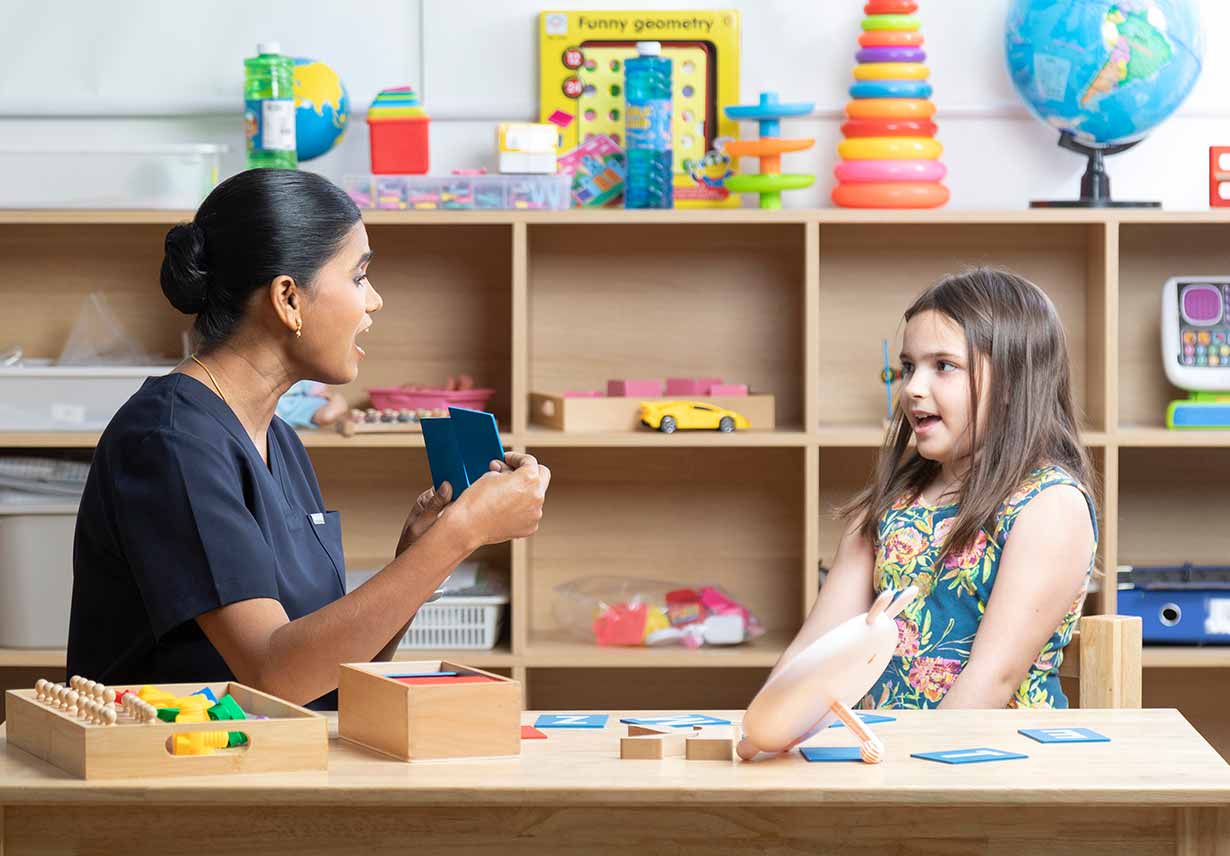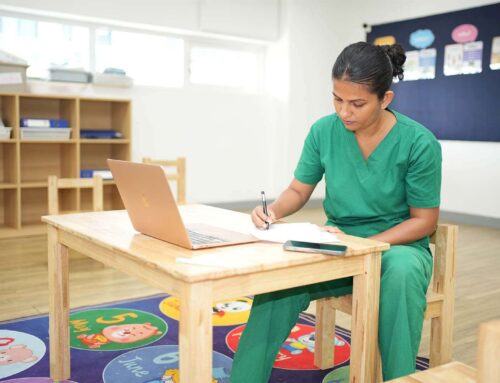Every parent looks forward to hearing their child’s first words. But what if those words take longer to come? Understanding speech therapy milestones helps families know what’s normal — and when to seek help. In Cambodia, especially in Phnom Penh, more parents are becoming aware of the importance of early communication development. Knowing when to act can make a huge difference in a child’s ability to express themselves, connect socially, and succeed academically.
What Are Speech Therapy Milestones?
Speech therapy milestones are key stages in a child’s ability to communicate through sounds, words, and sentences. These milestones vary slightly from child to child, but they provide a useful guide for understanding typical language development.
0–12 Months: Early Communication Begins
In the first year, babies learn to connect sound and meaning. They should:
-
Respond to voices and familiar sounds
-
Coo, babble (“ba-ba,” “da-da”)
-
Turn toward sound sources
-
Recognize their name
-
Use gestures like waving or pointing by 12 months
If a baby isn’t making sounds or showing interest in communication, this may indicate an early delay in auditory processing or social engagement.
1–2 Years: Words Emerge
Between one and two years, toddlers begin using real words. Expected milestones include:
-
Saying their first word by 12–15 months
-
Having a vocabulary of 20–50 words by 18 months
-
Combining two words by age 2 (“more milk,” “mama go”)
-
Understanding simple directions
At this stage, pronunciation doesn’t need to be perfect. The focus is on building meaning and confidence. However, if a child isn’t using words by 18 months, it’s worth consulting a professional such as a speech-language pathologist.
2–3 Years: Sentences and Understanding Grow
Toddlers between two and three years should:
-
Speak in short phrases or simple sentences
-
Use 200–500 words
-
Be understood by family members
-
Ask questions (“what’s that?”)
This is also when children’s speech begins to sound more like “real conversation.” In multilingual settings like Cambodia, slight delays can be normal, but consistent progress in at least one language is key.
3–4 Years: Clearer Speech and Storytelling
Preschoolers expand their vocabulary to 1,000+ words and begin to form complex ideas. They should:
-
Speak in sentences of four or more words
-
Tell simple stories
-
Be understood by people outside the family
-
Understand prepositions (in, on, under) and colors
Children in early education programs, such as those offered at OrbRom Center’s Preschool Program, often benefit from structured play and storytelling that reinforce these skills.
4–5 Years: Ready for School Communication
By age five, most children should:
-
Speak clearly and fluently
-
Hold back-and-forth conversations
-
Use future tense (“I will go”)
-
Understand stories and instructions
This stage is critical before starting school, as language impacts reading readiness, social skills, and confidence.
When to Worry About Speech Delays
Some variation in development is normal, but persistent delays should not be ignored. Here are signs that may indicate the need for speech therapy:
-
No babbling by 12 months
-
No words by 18 months
-
Difficulty combining words by 2.5 years
-
Speech hard to understand after age 3
-
Limited eye contact or lack of social interest
-
Frustration when trying to communicate
Parents in Phnom Penh often wonder whether bilingual homes cause speech delays. In truth, exposure to multiple languages does not cause delays — it may even enhance cognitive flexibility. However, if a child is behind in both languages, it’s best to consult a therapist.
For a detailed guide, visit Signs Your Child Might Need Speech Therapy.
Common Reasons for Speech Delays
Speech and language delays can stem from various factors, including:
-
Hearing Problems – Frequent ear infections or undetected hearing loss can hinder sound recognition.
-
Oral-Motor Issues – Difficulties with jaw, tongue, or lip coordination affect pronunciation.
-
Neurodevelopmental Conditions – Children with autism, ADHD, or apraxia may need extra support.
-
Environmental Factors – Limited social interaction or screen-heavy environments can slow development.
Professional assessments at centers like OrbRom Center can help determine the cause and design an appropriate plan.
Early Intervention: Why Timing Matters
Early speech therapy intervention has been shown to dramatically improve outcomes. The earlier a child begins therapy, the more progress they make in developing lifelong communication skills.
Children benefit most when therapy is fun, play-based, and family-centered. OrbRom’s Speech Therapy Services in Phnom Penh use activities like singing, storytelling, and picture-based play to make learning natural and enjoyable.
For younger children, programs like the Preschool Program offer early exposure to social and verbal learning, preparing them for school success.
What Parents Can Do at Home
Parents play a vital role in supporting speech development. Here are a few practical strategies:
1. Talk and Narrate Daily Life
Describe what you’re doing throughout the day — “We’re cutting fruit,” “Let’s wash your hands.” Constant narration builds word exposure.
2. Read Aloud Together
Picture books, rhymes, and storytelling help expand vocabulary and comprehension. Reading just 10 minutes daily can make a big difference.
3. Encourage Imitation and Play
Play is language in action. Use toys, puppets, or pretend play to model conversation and expression.
4. Limit Screen Time
Too much passive screen time can delay speech. Instead, prioritize interactive communication.
5. Celebrate Small Progress
Clapping, smiling, and responding to every attempt builds confidence and motivation.
Parents can find more practical strategies in Simple At-Home Exercises to Boost Your Child’s Speech Development.
When Professional Help Is Needed
If you notice any of the red flags listed earlier, it’s time to seek an evaluation. A speech-language pathologist (SLP) will assess areas such as articulation, comprehension, expression, and oral-motor function.
At OrbRom Center, certified therapists tailor programs to each child’s strengths and challenges, often combining speech and occupational therapy for holistic growth.
Therapy may include structured play, visual aids, sound modeling, or Augmentative and Alternative Communication (AAC) for non-verbal children. The key is early, consistent, and personalized support.
Supporting Speech Development in Cambodian Schools
Schools across Cambodia are becoming more aware of the role of communication in learning success. Teachers who understand developmental milestones can identify students who may need early help.
Integrating speech therapy support into classroom routines — for example, through storytelling, vocabulary games, or pronunciation practice — helps students of all abilities thrive.
Schools partnering with specialists from OrbRom Center in Phnom Penh have seen improved student participation, social confidence, and reading comprehension.
Conclusion: Every Voice Deserves to Be Heard
Understanding speech therapy milestones helps parents and teachers recognize when a child’s communication is on track and when support might be needed. In Cambodia, early awareness and professional guidance can make a life-changing difference for children with speech or language challenges.
If you’re concerned about your child’s speech development, consider scheduling an assessment at OrbRom Center’s Speech Therapy in Phnom Penh. The earlier you act, the sooner your child can find their voice — and their confidence.
We are the only Preschool specialized on children with special needs in PhnomPenh.
- Internationally qualified teachers
- Cambodia’s largest sensory room
- Outdoor swimming pool
- Covered outdoor playground📞 Phone: 077.455.993
Telegram Link: https://t.me/OrbRom






